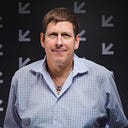When Michael Wolff Was at SXSW
The Forrest Four-Cast: January 6, 2018
This week’s particular White House scandal has a SXSW angle, as “Fire and Fury” author Michael Wolff was a keynote speaker at the event in 1999 (other keynotes that year were Broadcast.com’s Mark Cuban and experimental composer Philip Glass). Jon Lebkowsky conducted a pre-keynote interview with the author for the Austin Chronicle — click here to read that story. We caught up with Lebowksky this week to ask him what he remembered of that interview, as well as what he recalled of other aspects Wolff’s visit to March Magic. As for his take on much more current events, visit the Well to read the ongoing “State of the World 2018” conversation between Lebkowsky and frequent SXSW speaker Bruce Sterling.
When Michael Wolff was a keynote at SXSW in 1999, he was pushing his recently-published book “Burn Rate.” Twenty years later, what is your brief summary of the not-so-flattering profile of Silicon Valley contained in that book? Is “Burn Rate” still relevant today?
The book describes Wolff’s failure as an entrepreneur, and entrepreneurs are still failing every day. Not everybody’s cut out for that world, and I think that was true of him. He’s got more of a writer-pundit profile. At the time I was thinking how glad I was not to be swimming with sharks in Silicon Valley, but not long after that I had my own shark bite, when the dotcom bust happened and the project I was working on fell apart. Business failure makes for a lot of negative energy; I think Wolff resolved his angst by writing that book.
Similar to “Fire and Fury,” his style in “Burn Rate” drew a lot of criticism for quotes of industry leaders that may not have been entirely accurate. Didn’t you ask him about those quotes when you interviewed him?
I mentioned it in the introduction to the Austin Chronicle piece, but I don’t think we got into it in the brief time we had for the interview. I figured he was a gonzo journalist, writing a subjective account from memory, and maybe hacking the memory for effect. Kind of like a button-downed business-focused Hunter S. Thompson.
What else stands out in your memory about the interview you did with him at SXSW 1999?
It was a phone interview, we’d never met face to face, but it went pretty well. We ended with a question about convergence, and I thought he had his head around it pretty well. But I wondered whether it would strike people as “boring business stuff.” With a little more context at the time, I think I could have made the interview questions more interesting.
As I recall, the actual keynote speech he gave at SXSW 1999 had a few rough patches. I also recall that a lot of the audience was less than enamored with some of his opinions. What are your recollections of Wolff’s keynote speech that year?
What I remember best is that he walked out, glanced at his notes, and froze for about four minutes. I heard later that he’d brought the wrong notes, and it took him a few minutes to pick up. I recall having the impression that he had a darker vision for the Internet than I. He had picked up on something we discussed in the interview, where I mentioned Lance Rose’s contention that the Internet is not a medium, but an environment for media. He translated that as saying that the Internet is a distribution platform.
While this move isn’t a recent one, does it surprise you that he made the transition from aggressively covering technology to aggressively covering other media industries? And, with the new book, politics. What kind of larger conclusions do you draw from this transition?
We discussed that in the interview, that he was covering both traditional and new media. The question was about convergence, and he was talking about advertisers packaging media. So I’m not surprised — I suspect, like many of us, he saw media convergence coming and made that his beat. My understanding is that this political book happened because he knew Trump and was able to get into that inner circle as an observer. The opportunity presented itself, and he took it.
Hugh Forrest serves as Chief Programming Officer at SXSW, the world’s most unique gathering of creative professionals. He also tries to write at least four paragraphs per day on Medium. These posts often cover tech-related trends; other times they focus on books, pop culture, sports and other current events.
